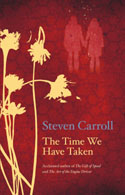 | Reviews of The Time We Have Taken by Steven Carroll Fourth Estate February 2007 |
[This novel won the 2008 Commonwealth Writers' Prize for Best Novel for the South-East Asia and South Pacific region. It was shortlisted in the Fiction category of the 2007 Age Book of the Year awards, shortlisted for the Vance Palmer Prize for Fiction in the 2007 Victorian Premier's Literary Awards, and has been longlisted for the 2008 Miles Franklin Award.]
From the publisher's page
One summer morning in 1970, Peter van Rijn, proprietor of the television and wireless shop, pronounces his Melbourne suburb one hundred years old.[Note: this is the third volume in a trilogy by Steven Carroll, following The Art of the Engine Driver, and The Gift of Speed, each of which made the Miles Franklin Award shortlist.]That same morning, Rita is awakened by a dream of her husband's snores, yet it is years since Vic moved north. Their son, Michael, has left for the city, and is entering the awkward terrain of first love.
As the suburb prepares to celebrate progress, Michael's friend Mulligan is commissioned to paint a mural of the area's history. But what vision of the past will his painting reveal?
Meanwhile, Rita's sometime friend Mrs Webster confronts the mystery of her husband's death. And Michael discovers that innocence can only be sustained for so long.
The Time We Have Taken is both a meditation on the rhythms of suburban life and a luminous exploration of public and private reckoning during a time of radical change.
Reviews
Michael McGirr in "The Age" compares Carroll's work to Elizabeth Jolley's in a favourable light: "It has the emotional stamina needed to draw life from the same characters over three independent novels...Carroll writes the kind of still
prose that invites the reader into a contemplative space. The irony is that his subject matter is restless...He details the life of a suburb nine miles north of Melbourne, from the late '50s to the early '70s. It is, as Carroll notes, an age enthralled by progress and, even more, by speed. But he insists on telling the story slowly...The result is a deeply satisfying encounter with the empty spaces that the suburb failed to fill both between people and inside them. The surface of Carroll's writing is deceptively calm." The problem with a lot of trilogies is that you need to be fully aware of the backstory before getting to the later works.
Katharine England in "The Advertiser" doesn't find that a problem here: "Each novel stands on its own, but they are more interesting considered together, making up as they do not only a history of that 20th century phenomenon, the suburb, but also a slow-moving, Proustian meditation on being and time...The repetitive accretion of detail, like the brush strokes of a pointillist, the echoes within the novel and from book to book, the use of tenses which base time in the present but refer constantly to past and future, contribute to the hypnotic effect of the whole."
In "Australian Book Review" Christina Hill finds reflections of other artistic orks in the novel: "While George Johnston's suburban Melbourne in My Brother Jack (1964) of the 1920s and 1930s is tacitly acknowledged as an influence on this novel, echoes of Gerald Murnane's work are also discernible in the subject matter and in the insistent specificities of the diction. This makes the prose mannered at times, but the suburb is represented with some of the inscrutable beauty of Howard Arkley's paintings of suburban houses."
Short Notices
Readings: "While Carroll's work is not overtly political, memory and the mythologising of the past are central themes, and he subtly but surely undermines the simplistic pre-lapsarian dream of the culture warriors while at the same time drawing his characters and their desires for escape or transcendence with humour, affection and empathy -- and without a hint of condescension."
Australian Online Bookshop: "The Time We Have Taken is a celebration of the rhythms and intricacies of suburban life, and a meditation on its limitations. Steven Carroll achieves a luminous intimacy with his characters as he explores both a society teetering on the edge of radical change, and the richness and complexity of that most common of Australian experiences -- the suburbs."
Other
"The Advertiser" ran a profile of the author in March 2007, just after the book was published.
